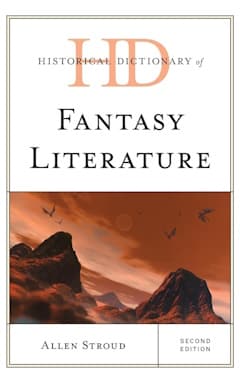
Historical Dictionary of Fantasy Literature (Second Edition) edited by Allen Stroud
(Rowman & Littlefield Publishers, 2023)
Reviewed by Kevan Manwaring
Impressively ambitious in scope, Allen Stroud’s monumental work now appears in a second edition, but with the inclusion of very contemporary updates ‘Historical Dictionary’ seems even more of a redundant title. All dictionaries are historical records from the moment of publication, however up-to-date the entries: the most recent ‘buzzword’ becomes a cultural curio within a few years. That said, a desire to be topical can result in a lack of perspective and depth: some of the most recent additions are rather embryonic and seem little more than placeholders (e.g., World Fantasy Award-winner, R.J. Barker, gets a rather sparse three lines; the significant, complex, and contested category of the ‘Anthropocene’ barely eleven lines—perhaps these will be fleshed out in a third edition?).
Clearly the result of a substantial amount of scholarship, nevertheless the wide-ranging entries seem less ‘definitive’ than a dictionary would suggest, whereas the ‘macrotext’ (to use Stroud’s term) of the introduction and chronology provides a more useful scholarly meta-frame. Stroud emphasises that the entries are not meant to be exhaustive, but starting points, encouraging further reading and research. The more technical terms, such as the numerous subcategories of Fantasy (e.g., Christmas Fantasy; Delusional Fantasy; Scholarly Fantasy; Rationalized Fantasy; Literary Satanism, etc.) are more valuable.
The pleasure of such a dictionary is in browsing through and discovering old friends and directions: a Borgesian labyrinth library of libraries. Yet there are some omissions (e.g., Graham Joyce; Jeanette Ng; Richard Jefferies); alongside some pleasing alphabetized bedfellows—Macdonald; Machen; Macleod. Clute and Grant’s Encyclopaedia of Fantasy (1999) feels more authoritative, and its definitions are often cited and re-iterated with minor modification. Nevertheless, Stroud’s work is a very useful resource for lecturers and students.
The inclusion of a bibliography is a welcome element and shows consideration to the book’s practical usage in pedagogy, as well as a gateway to many worlds of wonder.
Review from BSFA Review 22 - Download your copy here.
